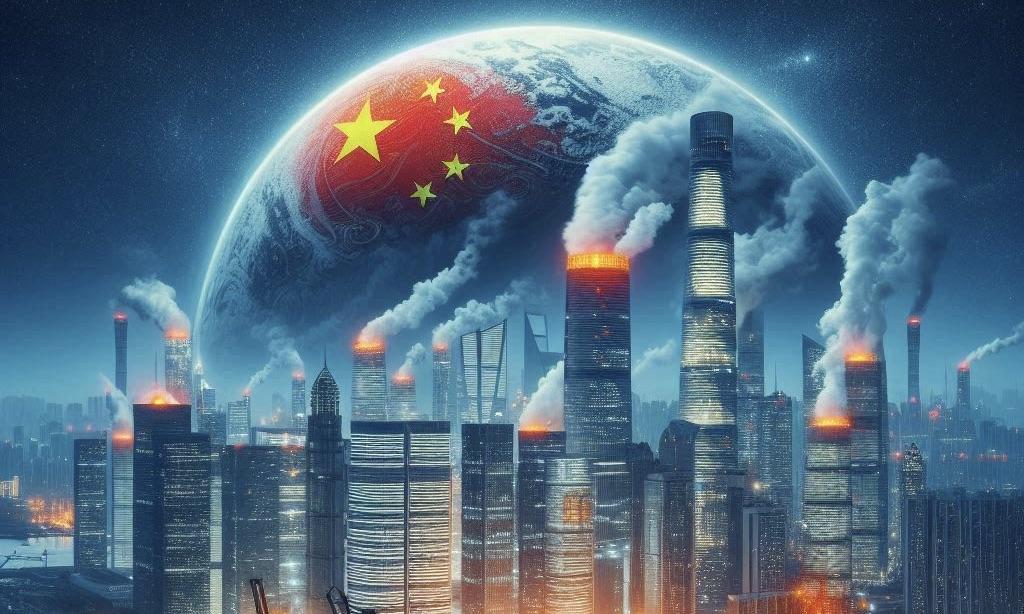China’s industrial production expanded at 4.5% in August, marking its slowest growth in five months. The data, released by the National Bureau of Statistics, has placed the country’s annual economic growth target of around 5% in jeopardy as retail sales and investment also slowed.
China’s Industrial Growth Slows to Five-Month Low, Retail Sales and Investment Also Weaken
In August, China's industrial production expanded at its slowest pace in five months, and growth in retail sales and investment also slowed. According to Nikkei Asia, this has placed Beijing's annual economic growth target of "around 5%" at risk.
The National Bureau of Statistics published data on September 14 showing a 4.5% increase in industrial output from the previous year. This was the lowest rate of increase since March, and it failed to meet the consensus forecast of 4.7% growth in a Bloomberg poll.
The industrial output number was subdued, consistent with the official data released earlier, which indicated that China's manufacturing activity contracted for the fourth consecutive month in August.
In August, total retail sales of consumer goods, which measure household expenditure, increased by 2.1%. This was a decrease from the 2.7% increase the previous month and was lower than the 2.5% forecast provided by Bloomberg.
Despite rescue measures, the world's second-largest economy remains burdened by the property sector. Continuing the decline observed in July, the average price of new homes in key cities, including Beijing, decreased by 4.2% in August.
China’s Property Investment Declines 10.2%, Fixed-Asset Growth Slows Amid Economic Pressure
Property investment experienced a 10.2% decline during the initial eight months of the year, which hurt fixed-asset investment, which experienced a 3.4% increase. The expansion fell short of expectations and was less than the 3.6% growth observed from January to July.
"Even with acceleration in government bond issuance, we doubt how effective[ly] the proceeds could be deployed for investment before the grip on debt management is loosened," economists at Citigroup wrote in a research note ahead of the release of the data.
In the second quarter, China's gross domestic product increased 4.7% year over year, falling short of expectations and placing pressure on the authorities, who are resolute in pursuing the full-year objective of "approximately 5%."
The sole cheerful spot is exports, which increased 8.7% last month. However, analysts are skeptical that the momentum will persist in the face of escalating trade tensions. Sluggish imports and stagnant inflation figures again underscored the necessity for additional stimulus to maintain economic growth, highlighting the deteriorating domestic demand.



 Rio Tinto Shares Hit Record High After Ending Glencore Merger Talks
Rio Tinto Shares Hit Record High After Ending Glencore Merger Talks  FDA Targets Hims & Hers Over $49 Weight-Loss Pill, Raising Legal and Safety Concerns
FDA Targets Hims & Hers Over $49 Weight-Loss Pill, Raising Legal and Safety Concerns  Asian Stocks Slip as Tech Rout Deepens, Japan Steadies Ahead of Election
Asian Stocks Slip as Tech Rout Deepens, Japan Steadies Ahead of Election  AMD Shares Slide Despite Earnings Beat as Cautious Revenue Outlook Weighs on Stock
AMD Shares Slide Despite Earnings Beat as Cautious Revenue Outlook Weighs on Stock  Ford and Geely Explore Strategic Manufacturing Partnership in Europe
Ford and Geely Explore Strategic Manufacturing Partnership in Europe  Global PC Makers Eye Chinese Memory Chip Suppliers Amid Ongoing Supply Crunch
Global PC Makers Eye Chinese Memory Chip Suppliers Amid Ongoing Supply Crunch  OpenAI Expands Enterprise AI Strategy With Major Hiring Push Ahead of New Business Offering
OpenAI Expands Enterprise AI Strategy With Major Hiring Push Ahead of New Business Offering  Global Markets Slide as AI, Crypto, and Precious Metals Face Heightened Volatility
Global Markets Slide as AI, Crypto, and Precious Metals Face Heightened Volatility  U.S. Stock Futures Edge Higher as Tech Rout Deepens on AI Concerns and Earnings
U.S. Stock Futures Edge Higher as Tech Rout Deepens on AI Concerns and Earnings  Gold and Silver Prices Rebound After Volatile Week Triggered by Fed Nomination
Gold and Silver Prices Rebound After Volatile Week Triggered by Fed Nomination  South Korea Assures U.S. on Trade Deal Commitments Amid Tariff Concerns
South Korea Assures U.S. on Trade Deal Commitments Amid Tariff Concerns  Trump Lifts 25% Tariff on Indian Goods in Strategic U.S.–India Trade and Energy Deal
Trump Lifts 25% Tariff on Indian Goods in Strategic U.S.–India Trade and Energy Deal  Bank of Japan Signals Readiness for Near-Term Rate Hike as Inflation Nears Target
Bank of Japan Signals Readiness for Near-Term Rate Hike as Inflation Nears Target  Dollar Steadies Ahead of ECB and BoE Decisions as Markets Turn Risk-Off
Dollar Steadies Ahead of ECB and BoE Decisions as Markets Turn Risk-Off  Asian Markets Slip as AI Spending Fears Shake Tech, Wall Street Futures Rebound
Asian Markets Slip as AI Spending Fears Shake Tech, Wall Street Futures Rebound  TrumpRx Website Launches to Offer Discounted Prescription Drugs for Cash-Paying Americans
TrumpRx Website Launches to Offer Discounted Prescription Drugs for Cash-Paying Americans  U.S. Stock Futures Slide as Tech Rout Deepens on Amazon Capex Shock
U.S. Stock Futures Slide as Tech Rout Deepens on Amazon Capex Shock 





























